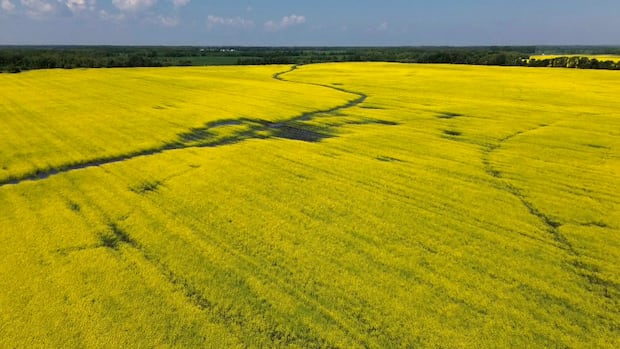Nichole Neubauer, a farmer in southeastern Alberta, is calling on the federal government to do more to back Canada’s agriculture industry, as she said she’s at risk of losing thousands of dollars on her canola crops due to new tariffs from China.
“It really comes down to government policy and having our folks in Ottawa stand up for our bread-and-butter industry, understanding that agriculture is fundamental,” said Neubauer.
Neubauer and her husband Mark, who own and operate Neubauer Farms 25 kilometres east of Medicine Hat, are among more than 900 canola producers in southeastern Alberta who watched prices fall after China introduced a 75.8 per cent tariff on Canadian canola seed earlier this week.
The new levy comes a year after Beijing opened an anti-dumping investigation into Canadian canola. Dumping is a trade practice that sees exports from one country flood a foreign nation’s market with goods at prices lower than their domestic cost, undercutting local industry.
Canada has denied participating in dumping, with politicians and farmers saying canola growers follow rules-based trade.
China’s probe followed Canada’s 100 per cent tariff on Chinese-made electric vehicles, and a 25 per cent levy on Chinese steel and aluminum.

Chinese tariffs on Canadian canola have farmers bracing for the worst
A new Chinese tariff of over 75 per cent on Canadian canola seed takes effect today, effectively closing Canada’s biggest export market for the product. The tariffs are an escalation in a mounting trade dispute between the two countries.
After China placed 100 per cent tariffs on Canadian canola meal and oil earlier this year, the latest tax means all Canadian canola products face fees when shipped into China.
Rick White, president and CEO of the Canadian Canola Growers Association, said China’s tariff “will have an immediate and substantive impact” on farmers’ ability to sell their canola.
“Canadian farmers are globally competitive and if a solution is not found swiftly, the impact will be quickly felt on our farms and in our rural communities,” said White.
The industry contributes more than $43 billion annually to the Canadian economy, and employs around 200,000 people, according to the growers association.
‘A wing and a prayer’
Canola has been a core part of the crop rotation at Neubauer Farms since the early 2000s. It’s an expensive crop to put in the ground, but it’s one that can pay off.
In any given year, canola producers deal with varying weather conditions, like drought or early frost, that can cause problems for their crops.
That’s part of farming, explained Neubauer, and producers have tools they can use to “mitigate and manage those risks.”
But how Ottawa establishes and maintains trade relationships with other countries is out of their control.
Nichole Neubauer, who runs Neubauer Farms with her husband Mark, said she has planted about 200 acres of canola this year. (Eli Ridder/CBC News)
“The part about agriculture that’s so challenging is, up front, you put out hundreds of thousands of dollars just to get the crop in, and you’re doing that on a bit of a wing and a prayer that there’s going to be something to put in the bin at the end of it all,” said Neubauer.
“You really need to count on knowing that there’s going to be a market for it. And at this point in time, we will harvest our canola, it’ll go in a bin and it’ll just sit there and we won’t sell it.”
Neubauer said selling her farm’s canola product under the current trade conditions would result in a “significant loss” of $40,000 to $50,000 to the family farm.
‘Gut punch’
Alberta farmer Alan Hampton described China’s tariffs as a “gut punch” and agrees with Neubauer that Ottawa needs to work swiftly to find a solution.
“Because it’s a political issue created by the federal government, I think it’s their responsibility to come to canola producers to get up to some solutions,” said Hampton, who also serves as an Alberta Canola regional director for southeastern Alberta.
“If you’re going to create the problem, you better give out the solution to solve it.”
As the tariff came into force Thursday, Prime Minister Mark Carney said he is considering measures to support farmers across Canada.
Carney said he and Saskatchewan Premier Scott Moe agreed to continue talking with agriculture groups about possible options, but didn’t reveal any details.
Carney said Thursday that Canada will advance talks with China, while also aiming to diversify its trade partners.
‘Investment in the future’
China is the second-largest market for Canadian canola, with exports of seed, oil and meal valued at $4.9 billion in 2024, according to the Canola Council of Canada. Canola seed accounts for about three quarters of those exports.
Andre Harpe, chair of the Alberta Canola Producers Commission, said it’s part of a long, mostly healthy trading relationship between Canada and China that the federal government should try to restore.
“I would tell them to go back to the table… and talk to the Chinese government and let’s see how this can be resolved,” said Harpe.
 Andre Harpe, a canola farmer from Valhalla Centre, Alta., is currently serving as chair of the Canadian Canola Growers Association. He said the federal government should invest in in the canola-based biofuel market. (Courtesy: Canadian Canola Growers Association)
Andre Harpe, a canola farmer from Valhalla Centre, Alta., is currently serving as chair of the Canadian Canola Growers Association. He said the federal government should invest in in the canola-based biofuel market. (Courtesy: Canadian Canola Growers Association)
Ottawa should also invest in domestic solutions, like the renewable fuel industry, that will buy from canola producers, said Harpe. Canola seeds can be heated and crushed to extract oil that can be used to produce biodiesel for vehicles, and glycerin for the production of soaps, cosmetics and pharmacenuticals.
“It can be done fairly quickly and would be a great long-term solution and keep the industry stable for years to come,” said Harpe.
“Not only would it help Canadian farmers, but it would help the Canadian economy.”
Harpe noted a new Imperial Oil renewable diesel project near Edmonton could also be part of the solution. He said the facility at full capacity could take about half of the canola seed Canada sends to China in a year.
